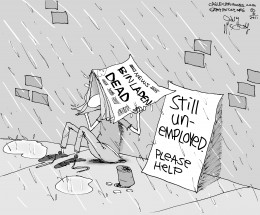
Yesterday, news emerged that the Navy SEAL responsible for killing Osama bin Laden in May 2010 is struggling to find a steady paycheck. After leaving the service in September 2010 — three years before reaching the 20-year mark at which veterans receive benefits — the SEAL, known only as the Shooter, was, apparently, simply forgotten by the government.
Well, actually, that’s not entirely true. Apparently the SEAL Command told the Shooter they could find him a job — driving a beer truck in Milwaukee.
It would take a cold, cold bastard to make the argument, with a straight face, that the man who personally shot the world’s most wanted man dead should be simply discarded by the country he spent 16 years defending.
Yet somehow, despite all the talk of protecting our veterans, the Shooter finds himself with minimal health care and a growing pile of bills, when the president himself said, “No one who fights for this country overseas should ever have to fight for a job or a roof over their head, or the care that they have earned when they come home.”
It’s doubtful — near-impossible, in fact — that Obama was given the choice between extending early benefits to the Shooter, and not, and said, “Well, I guess what he did was OK, but screw him,” so the angry accusations that will inevitably be leveled against him, personally, are nothing more than meaningless political spitballs.
But now that attention has been drawn to the plight of the Shooter — and more broadly, to the one in 10 veterans today who are uninsured in this country — surely it is time for the president to step in and take steps that go beyond empty rhetoric.
This is not to say there’s been no progress on helping our veterans off the battlefield. This week, the Veterans Affairs Department announced it was adding 1,000 mental health professionals to its staff — a necessary, if delayed response to the skyrocketing suicide rates and instances of PTSD sufferers turned violent.
But it shouldn’t take years to finally bolster mental health staff in the VA. It shouldn’t take the revelation that one of our nation’s greatest heroes is struggling to make ends meet to say, “Hey, maybe this isn’t so cool.”
Surely, our nation, which oversees the largest military budget by far and decides where and when to cut spending for which welfare programs, can agree that, in this instance, doing a better job looking out for our veterans when they return home is worth it.


